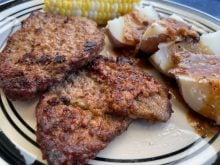WHITEMOUTH, Man. – Nathan Abraham had everything he wanted: a farm on the family’s original homestead quarter; a bustling livestock business; a happy family.
But as he lay prone in the dirt of a pen, with a 135 kilogram wild boar sow stomping him, the independent farming lifestyle didn’t seem quite as romantic.
It did, however, give his parents a laugh.
“We were driving by at the time,” said his mother Linda about Nathan’s sow-beating experience a couple of years ago.
“We saw the whole thing.”
Read Also

AgriStability updates offer stronger support for farmers
One of the most significant updates to the AgriStability program for the 2025 program year is the increase in the compensation rate.
Added father Richard: “It wasn’t looking good.”
Linda, Richard and Nathan’s wife Tracy laughed about the humbling experience for the mid-20s producer.
“I had a welt from that the size of a baseball,” he said of experience.
The Abrahams are a self-reliant bunch of city folks who moved out to the country in the last decade to take on the challenges of the wild boar industry.
They had a few shoestring years at the start, when they farmed without a tractor, had to find their own markets for the boars and develop a farm without any help from the bank.
But now, even though they still farm on a single quarter section and have only bought a real farm tractor in the past couple of years, they are a well-established livestock operation that markets animals for other producers and sells animals and meat to American markets and meat to a Japanese buyer.
Looking back on their farming adventure, which began in 1998, Richard doesn’t quite understand why the family never became discouraged.
“I don’t know if it was the animals, or wanting to get away from the city that drew us back here,” said Nathan, whose great-grandfather originally broke the land here on the eastern fringe of the Prairies.
“I just knew I wanted to be here.”
Tracy, who was Nathan’s high school sweetheart in Winnipeg before becoming his wife, said she’s thrilled with her life, as busy and crazy as it can get on a farm with hundreds of wild boars and two young boys.
“I wanted to be here. I wanted this lifestyle,” she said, as the family sat around the table of their comfortable used-to-be-a-trailer home.
The house now has only one wall and one room remaining from the original trailer structure, which has been expanded.
Linda and Richard live just across the creek, on the same quarter.
Both couples followed the call of the land in the late 1990s, and both took up wild boar produc-tion. Linda and Richard originally farmed near Balmoral, but after Nathan made a deal with his grandparents to take over this land, everyone acknowledged that it made more sense to work together at one site rather than two, since both couples marketed together.
Richard and Linda moved in and joined Nathan and Tracy. That created an odd situation, with Nathan and Tracy being the more senior producers on the quarter and his parents the newcomers.
“It was very, very tough figuring out a place for everyone,” said Nathan about the division of labour.
“Where did everybody fit on the farm? What was everybody’s role?”
While Nathan is an aggressive worker and businessperson, Richard has a cooler, more relaxed character that complements his son’s strengths.
“I’m pretty easy-going. I only had to kick his arse a couple of times,” Richard said, joking.
Mother and daughter-in-law also work well as a team, both in administrative and financial work, and often with overall wild boar production.
Nathan and Richard, after some bad experiences with hired trucking, deliver their own animals mostly to the southern United States. That has left Linda and Tracy to look after hundreds of wild boar.
As the farm has become busier, they hired a worker to look after the animals’ feeding and other needs, so it’s less demanding when Richard and Nathan leave town.
Most of the Abrahamses’ wild boars are sold to hunting operations in the U.S. south, where both hunting and pork are popular. A feisty boar brings good money, so Nathan works hard to ensure that the animals he produces are what hunters want to bag. Animals that don’t quite fit the hunting market – which likes meanness and a tough look – are sold to U.S. meat buyers.
They also slaughter some of their animals at Winkler, Man., for sale and shipment to a Japanese buyer. Some meat is also sold to fancy Winnipeg restaurants.
The Abrahams are in the pleasant position of having more markets than pigs, so they can be picky. Tracy doesn’t promote local meat sales much any more because she doesn’t want to reduce sales to the U.S.
“If people call, we make it available, but I don’t call people any more,” she said.
Nathan’s trucking career began when he rode along in the cab of a truck delivering his first shipment of wild boar south. He slept on the floor and tagged along so he could meet his customers and figure out how to provide them what they wanted.
“I wanted to see who I was selling them to,” said Nathan.
“I wanted to build my business on the personal level. I wanted to show my service and dedication.”
He didn’t ride along on the next shipment, which ended up with a number of dead animals. He gave up on custom trucking and started hauling his hogs down to the U.S. every two weeks, using a one tonne truck and a small trailer.
A year ago the family bought a semi and a big livestock trailer, so Richard and Nathan don’t have to be away from the farm as often.
But still, trucking is a big time commitment because they ship about 2,000 wild boar per year and gather wild boar from other prairie farms.
Richard and Nathan also do all of the farm’s maintenance and most of the other skilled work. Richard apprenticed as a millwright and Nathan learned carpentry in Winnipeg.
“We’d be in trouble if we didn’t have these skills we picked up in the city,” said Richard.
Tracy now has her hands full with both the administrative and financial side of the business and with 21/2Ðyear-old Braden and four-month-old Sawyer.
Braden loves the tractor, “and it’s hard to keep him in when his dad is out baling and it’s too dusty,” she said.
Tracy at one time wanted to become a biochemist or geneticist and started attending the University of Manitoba’s agriculture degree program. She was good at math and science and wanted to see if she could combine that with farming.
“She wanted to clone animals,” said Nathan.
“Wouldn’t that be useful now,” said Tracy with a grin.
“We could clone Frank. We could always have a Frank.”
Frank is the big, mean herd sire on the farm, a 225 kg brute.
Nathan also started attending the
University of Manitoba agriculture diploma program, but both he and Tracy were frustrated by the other people in the program, and with the time they would have to spend at school.
“Everybody that was in my class was trying to get away from the farm,” said Tracy.
“I said, ‘no way. I grew up in the city. I’ve been here long enough. I want to be on a farm.’ ”















